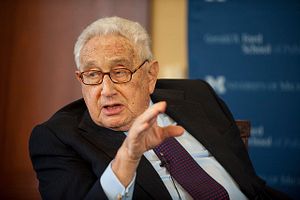In World Order, Henry Kissinger offers his latest explanation of China’s unhelpful position on North Korea’s nuclear program. It is no more persuasive or intellectually satisfying than other defenses of Beijing’s behavior presented over the past two decades. As such, it continues to beg the question: What is China’s real game?
Kissinger writes: “For China, North Korea embodies complex legacies.” The Korean War symbolized “China’s determination to end its ‘century of humiliation’ and ‘stand up’ on the world stage.” That experience also cautions Beijing against getting dragged into unwanted wars with unpredictable consequences. But then comes this statement, which would be a non sequitur even if it were accurate: “That is why China and the United States have taken parallel positions in the UN Security Council demanding that North Korea abandon – not curtail – its nuclear program.”
While it is true that Beijing and Washington ended up voting for final versions of the three Security Council resolutions on Pyongyang’s nuclear project, it was only after China greatly watered down – some might say emasculated – the more vigorous condemnations and punitive actions the U.S. had proposed. Regarding the real work in the Council – the deliberations and crafting of the Resolutions – it is a bit of a stretch to call American and Chinese positions “parallel” rather than competing or even conflicting. The bottom line, as reported by the Arms Control Association, is a mere delay in Pyongyang’s march toward complete nuclear breakout: “To this date, UN Security Council resolutions have been largely unsuccessful in preventing North Korea from advancing its nuclear weapons and ballistic missile programs, although the sanctions have slowed development in these areas.”
The resolutions have failed in their stated goal not only because they have been weak from the outset thanks to Beijing, but also because China has been reluctant to enforce even the limited sanctions they prescribe. Without real teeth, the resolutions have been little more than an annoying inconvenience to Pyongyang. Worse, they signal Kim Jong-un, as they did his father, Kim Jong-il, that China still has the North’s back in its nuclear weapons confrontation with the West.
As for Kissinger’s non sequitur, it is mystifying how China’s indulgence of North Korea’s nuclear program relates to either of the two supposed lessons Beijing learned from the Korean War. Kissinger implies that by protecting North Korea from meaningful international sanctions and enabling continuation of its nuclear program, Beijing see itself as standing up to the West, sticking a finger in the eye of the world that treated China so badly in the last century. If nationalistic payback is indeed the operating motivation of the People’s Republic, then the West is still dealing with a Communist Party global outlook that Kissinger and Richard Nixon advertised as having departed with Mao Zedong. Kissinger recounts: “In 1979, China changed course and, under Deng Xiaoping, proclaimed a nonideological foreign policy.”
Similarly, it is difficult to grasp how Beijing’s professed aversion to renewed instability on the Korean Peninsula is served by Pyongyang’s nuclear program. North Korea’s conduct over the last several years, particularly vis-à-vis South Korea, has, if anything, been more aggressive as its nuclear and missile programs have advanced. Most recently, the 2010 sinking of the Cheonan and shelling of Yeonpyeong Island killed scores of South Korean sailor and civilians.
Contradicting his original premise, Kissinger concedes that its small but potent nuclear stockpile has “emboldened Pyongyang into risk-taking disproportionate to its capabilities, raising the danger of another war on the Korean Peninsula.” That, of course, flies in the face of the anti-war lesson Beijing supposedly learned from the earlier Korean conflict. Kim, like his father, believes he now has a nuclear shield against any serious South Korean or American response to his provocations, and China’s protective policies make it complicit in that dangerous adventurism – hardly the “strategic partner” Kissinger and other China experts tout.
Demonstrating the cynical hollowness of China’s Security Council posture are these Kissinger statements: “For the Pyongyang regime, abandoning nuclear weapons may well involve political disintegration. But abandonment is precisely what the United States and China have publicly demanded in the UN resolutions that they have fostered.”
Kissinger argues that “Many Asian countries – including China – view North Korea’s policies as destabilizing but regard a collapse of North Korea as a greater danger.” (He does not elaborate on which Asian nations share China’s view.) Taking the Chinese position at face value, Kissinger reasons that China and the United States need “to work out a collaborative strategy for a denuclearized, unified Korea that leaves all parties secure and more free.”
But, for more than twenty years, Kissinger has rationalized Beijing’s sheltering of North Korea and its nuclear program precisely as a guarantee against a unified non-Communist Korea. Neither he nor other Asia experts have explained how or why a North Korean regime that actually abandoned nuclear weapons would be doomed to collapse – especially since it would mean the end of sanctions and an inflow of Western aid. The suggestion seems to be that under such a scenario the starving North Korean populace would rise up and demand that the regime keep the nukes and forego the food – an implausible explanation, to say the least.
An alternative explanation of Beijing’s consistent enabling of North Korea’s nuclear and missile program is that it has served China’s strategic interests by significantly distracting Washington’s diplomatic focus while elevating China’s status as a “responsible” regional power. When that possibility was posed to Kissinger at a recent Washington conference launching his new book, he rejected it as inconsistent with his own thesis. The ultimate practitioner of American realpolitik needs to take another look at the China-North Korea reality.
Joseph A. Bosco is a member of the U.S.-China task force at the Center for the National Interest and a senior associate at the Center for Strategic and International Studies. He previously served as China country desk officer in the office of the secretary of Defense from 2005-2006.

































